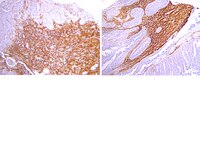Development of a three-dimensional bone-like construct in a soft self-assembling peptide matrix.
Marí-Buyé, N; Luque, T; Navajas, D; Semino, CE
Tissue engineering. Part A
19
870-81
2013
Zobrazit abstrakt
This work describes the development of a three-dimensional (3D) model of osteogenesis using mouse preosteoblastic MC3T3-E1 cells and a soft synthetic matrix made out of self-assembling peptide nanofibers. By adjusting the matrix stiffness to very low values (around 120 Pa), cells were found to migrate within the matrix, interact forming a cell-cell network, and create a contracted and stiffer structure. Interestingly, during this process, cells spontaneously upregulate the expression of bone-related proteins such as collagen type I, bone sialoprotein, and osteocalcin, indicating that the 3D environment enhances their osteogenic potential. However, unlike MC3T3-E1 cultures in 2D, the addition of dexamethasone is required to acquire a final mature phenotype characterized by features such as matrix mineralization. Moreover, a slight increase in the hydrogel stiffness (threefold) or the addition of a cell contractility inhibitor (Rho kinase inhibitor) abrogates cell elongation, migration, and 3D culture contraction. However, this mechanical inhibition does not seem to noticeably affect the osteogenic process, at least at early culture times. This 3D bone model intends to emphasize cell-cell interactions, which have a critical role during tissue formation, by using a compliant unrestricted synthetic matrix. | Immunofluorescence | | 23157379
 |
Increase in GLUT1 in smooth muscle alters vascular contractility and increases inflammation in response to vascular injury.
Adhikari, N; Basi, DL; Carlson, M; Mariash, A; Hong, Z; Lehman, U; Mullegama, S; Weir, EK; Hall, JL
Arteriosclerosis, thrombosis, and vascular biology
31
86-94
2010
Zobrazit abstrakt
The goal of this study was to test the contributing role of increasing glucose uptake in vascular smooth muscle cells (VSMCs) in vascular complications and disease.A murine genetic model was established in which glucose trasporter 1 (GLUT1), the non-insulin-dependent glucose transporter protein, was overexpressed in smooth muscle using the sm22α promoter. Overexpression of GLUT1 in smooth muscle led to significant increases in glucose uptake (n=3, Pless than 0.0001) as measured using radiolabeled 2-deoxyglucose. Fasting blood glucose, insulin, and nonesterified fatty acids were unchanged. Contractility in aortic ring segments was decreased in sm22α-GLUT1 mice (n=10, Pless than 0.04). In response to vascular injury, sm22α-GLUT1 mice exhibited a proinflammatory phenotype, including a significant increase in the percentage of neutrophils in the lesion (n=4, Pless than 0.04) and an increase in monocyte chemoattractant protein-1 (MCP-1) immunofluorescence. Circulating haptoglobin and glutathione/total glutathione were significantly higher in the sm22α-GLUT1 mice postinjury compared with controls (n=4, Pless than 0.05), suggesting increased flux through the pentose phosphate pathway. sm22α-GLUT1 mice exhibited significant medial hypertrophy following injury that was associated with a significant increase in the percentage of VSMCs in the media staining positive for nuclear phosphoSMAD2/3 (n=4, Pless than 0.003).In summary, these findings suggest that increased glucose uptake in VSMCs impairs vascular contractility and accelerates a proinflammatory, neutrophil-rich lesion in response to injury, as well as medial hypertrophy, which is associated with enhanced transforming growth factor-β activity. Celý text článku | | | 20947823
 |
Fisetin lowers methylglyoxal dependent protein glycation and limits the complications of diabetes.
Maher, P; Dargusch, R; Ehren, JL; Okada, S; Sharma, K; Schubert, D
PloS one
6
e21226
2010
Zobrazit abstrakt
The elevated glycation of macromolecules by the reactive dicarbonyl and α-oxoaldehyde methylglyoxal (MG) has been associated with diabetes and its complications. We have identified a rare flavone, fisetin, which increases the level and activity of glyoxalase 1, the enzyme required for the removal of MG, as well as the synthesis of its essential co-factor, glutathione. It is shown that fisetin reduces two major complications of diabetes in Akita mice, a model of type 1 diabetes. Although fisetin had no effect on the elevation of blood sugar, it reduced kidney hypertrophy and albuminuria and maintained normal levels of locomotion in the open field test. This correlated with a reduction in proteins glycated by MG in the blood, kidney and brain of fisetin-treated animals along with an increase in glyoxalase 1 enzyme activity and an elevation in the expression of the rate-limiting enzyme for the synthesis of glutathione, a co-factor for glyoxalase 1. The expression of the receptor for advanced glycation end products (RAGE), serum amyloid A and serum C-reactive protein, markers of protein oxidation, glycation and inflammation, were also increased in diabetic Akita mice and reduced by fisetin. It is concluded that fisetin lowers the elevation of MG-protein glycation that is associated with diabetes and ameliorates multiple complications of the disease. Therefore, fisetin or a synthetic derivative may have potential therapeutic use for the treatment of diabetic complications. | Western Blotting | Mouse | 21738623
 |



















